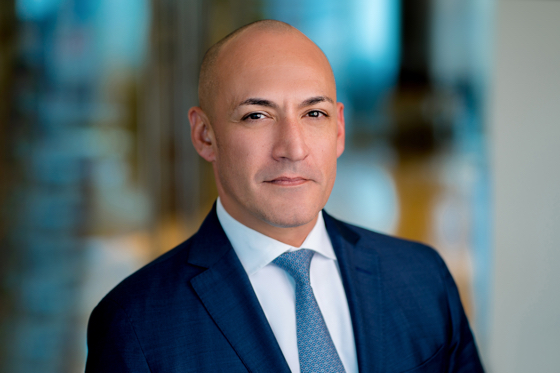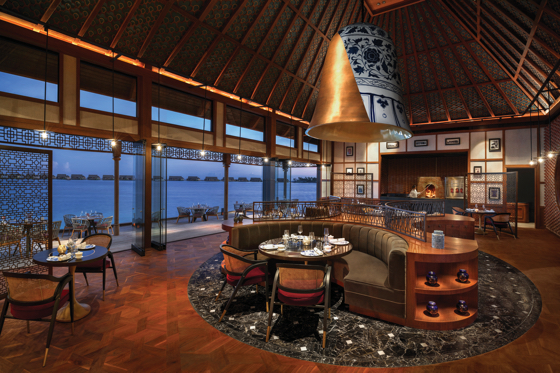Adam Crocini grew up in a big Italian family in Connecticut where the kitchen was the hub for socializing and eating good food. On the weekends, his parents took him to New York City to dine at some of the country’s best restaurants.
With that kind of background, it’s not surprising that Crocini went into food and beverage; his first job at age 16 was as a barback for the Max Restaurant Group. Today, Crocini is the global head and vice president in charge of food and beverage brands for Hilton, overseeing all F&B operations across the group’s 18 brands. “That part-time job really became my life’s work and my passion,” he told HOTELS during a recent interview.
Contributed by Jeanette Hurt
“One thing I encourage — the ‘secret sauce’ — is [being] thoughtful about everything you do and what you are trying to communicate to the guest — what story you’re trying to tell and what experience you’re trying to create,” Crocini said. “If you really ground yourself with an idea of where you want to be, you think about the uniforms, the design, the lighting, the music, and at the same time, you ask yourself, ‘how can we push boundaries and invent?’ The industry calls for that right now.”
Consumers are savvier than ever before, Crocini noted, and hotels need to be aware of this to stay relevant. “Hilton has a history of being the first in things, and I always ask, ‘how can we [attract] a customer today that we can have 20 years from now?’ When we look at food and beverage programs for a hotel, we program for the community, not just the hotel.”
Crocini said he first learned principles of good hospitality in high school, mentored by the owners of the restaurant group he worked for. “They taught me everything about the business of running a reservation book on pen and paper for a 300-seat dining room.”

Crocini knew he wanted to be in the front of the house, but he also needed to understand what went on in the back. He attended the Culinary Institute of America and landed a job at the Four Seasons Hotel New York before joining Wolfgang Puck in Las Vegas. “[Puck] taught me that the development of restaurant concepts is anchored in hospitality and service. It was not just a good food and service experience; it was lighting, the way you walked guests to the table and how the table was set. That was the DNA we tried to embody.”
“To be really great, you need to take everything you do seriously,” Crocini said. “We are in a creative business and it’s our passion, but it’s still a business and it has to be commercially successful.”
The idea, he said, is to create experiences that will distinguish one restaurant from another. Crocini uses the example of an American steakhouse — how different can one prototypical restaurant be from another?
“What you want to do is find a new way to create a lasting memory for the guest,” he noted.
At this steakhouse, for example, a guest might order a fine whiskey on the rocks, but to make this experience more vibrant, the bartender might reveal the bottle with a bit of showmanship before carving a perfect globe of ice and putting it in a crystal glass. “There’s a bit of theater and emotion; you create a lasting memory for the guest,” Crocini said. “The next time they order whiskey on the rocks, they’ll be missing that perfect crystal ice ball.”

Beyond the pandemic
COVID-19 has caused hoteliers to rethink the guest experience, and Crocini expects prepackaged food, as well as artful bento boxes at events in lieu of buffets, to continue. But even in the chill of winter, people went outside to eat and drink in igloos and by firepits. “People want to return to restaurants to socialize, and I think [business] is going to return stronger than ever because of pent-up need for community and connection,” he said.
When will this explode into returned business? Crocini predicts global domestic travel will rebound first. “As soon as people feel comfortable [traveling], we will return bigger than ever because of the time during which people haven’t been able to do what they love to do,” Crocini said.
He believes there will be a backlog of people clamoring to hold weddings or conventions. “Couples might have had a commitment ceremony or courthouse wedding, but at the end of the day, they want their celebration,” he said. “People also want to connect for business. You can’t do everything over Zoom.”
Crocini predicts that the kitchens in hotels will once again be bustling, noting that there is a place for ghost kitchens, but that Hilton is looking to bring all of its kitchens back online.
The casualization of fine dining, however, will continue. “People want a beautiful gourmet meal, but they don’t always want formality,” he said. What they do want, he notes, is the same attention to detail they’d receive in a Michelin-starred restaurant — no shortcuts. But instead of dressing staff in formal waistcoats and bowties, they might wear Converse sneakers and high-quality denim. “It’s still fine dining, but it’s designed without the look of formal dining with high-backed chairs and multiple yards of white linen.”
In managing his global team, Crocini is inspired by all the young, talented chefs and their passion, and he acts to guide and inspire. “I don’t micromanage. I want people to have the opportunity to make decisions and to put themselves forward to learn and to learn from their mistakes. It’s important to showcase their passions, supporting them in what they’re great at and challenging them in areas where they’re not.”
